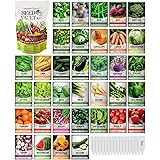Raised Garden Bed Galvanized Planter Box Outdoor, 5ft Oval Large Rot-Resistant Metal Garden Bed Planter for Vegetables Flower Herb (Silver)
30% OffBest Choice Products 8x2ft Outdoor Wooden Raised Garden Bed Planter for Vegetables, Grass, Lawn, Yard - Natural
22% OffComposting is a simple and effective way to reduce waste, save money on fertilizer, and create nutrient-rich soil for your garden. If you’re new to composting or have been thinking about starting, this beginner’s guide will help get you started in no time!
What Is Composting and Why Should You Start?
Composting is the process of breaking down organic matter into a rich, nutritious soil amendment that can be used to improve plant growth and health. By composting at home, you can divert food scraps, yard waste, and other organic materials from landfills where they would decompose without oxygen and produce methane gas, a potent greenhouse gas. Instead, by composting these materials, you can create a valuable resource for your garden while reducing your carbon footprint.
The Basics of Starting Your Own Compost Pile
To start composting at home, you’ll need three things: brown material (such as leaves or shredded paper), green material (such as fruit and vegetable scraps or grass clippings), and water. Mix these ingredients together in a pile or bin, and let nature take its course. Here are some tips for getting started:
1. Choose the right location – Find a spot in your yard that gets plenty of sunlight and has good drainage. Avoid placing your compost pile near trees or buildings, as it may attract rodents or insects.
2. Size matters – The ideal size for a compost pile depends on how much organic material you plan to add each week. As a general rule, aim for a pile that is between 3-5 feet wide and tall enough to reach up to your waist.
3. Get the mix right – To ensure that your compost pile stays warm and active, aim for a ratio of two parts brown material to one part green material. You should also try to keep your pile moist but not too wet, which can lead to odors and slow decomposition.
4. Turn your pile regularly – To encourage airflow and speed up decomposition, turn your pile every few weeks using a pitchfork or shovel. This helps to aerate the pile and distribute the heat generated during the composting process.
Tips for Maintaining a Healthy Compost Pile
Once you’ve gotten your compost pile going, there are several ways to maintain a healthy, productive system:
1. Keep adding fresh materials – To keep your pile hot and active, continue to add fresh green and brown materials to your pile on a regular basis.
2. Monitor moisture levels – Make sure your pile is neither too dry nor too wet. If your pile feels like a sponge when squeezed, it needs more water; if it feels soggy, give it a break from watering.
3. Aerate your pile – Use a pitchfork or shovel to poke holes in your pile and introduce oxygen, which speeds up decomposition.
4. Control pests and diseases – Check your pile regularly for signs of pest infestation or disease outbreaks. If necessary, use natural remedies such as garlic powder or neem oil to control pests, or remove any affected materials to prevent further spread.

Troubleshooting Common Composting Problems
If you encounter problems with your compost pile, here are some common issues and solutions:
1. Odor – If your pile smells bad, it could be due to excess moisture or an imbalance of greens and browns. Try turning your pile more frequently or adjusting the ratios of materials.
2. Slow decomposition – If your pile isn’t heating up or decomposing quickly enough, consider adding more nitrogen-rich materials such as coffee grounds or manure, or turn your pile more often.
3. Disease or pest infestations – Remove any affected materials immediately and treat with natural remedies such as garlic powder or neem oil.
How to Use Your Homemade Compost in the Garden
Once your compost has fully broken down and reached a stable state, you can begin using it in your garden. Here are some tips for incorporating homemade compost into your landscape:
1. Spread it thickly – Apply a layer of compost at least 2 inches deep around plants and flowers to provide nutrients and retain moisture.
2. Mix it in – Incorporate compost into your existing soil before planting seeds or seedlings to enhance root development and promote strong growth.
3. Feed your lawn – Sprinkle compost over your lawn to boost soil health and stimulate grass growth.
By starting your own compost pile, you can reduce waste, save money, and create a valuable resource for your garden. With just a little effort and attention, anyone can become a successful composter!
Related Content
- From Compassion to Action: NOVEC Employees Assist Charities on Day of Caring | Prince …
- PE12 8JB, Midwest Polychem Limited: environmental permit application advertisement – EPR …
- More investment needed to make hazardous cleaning operations safer: Govt
- Queens waste committee lays out plan for zero waste future
- Larison: Relax, your food scraps aren’t changing the climate – Complete Colorado













































